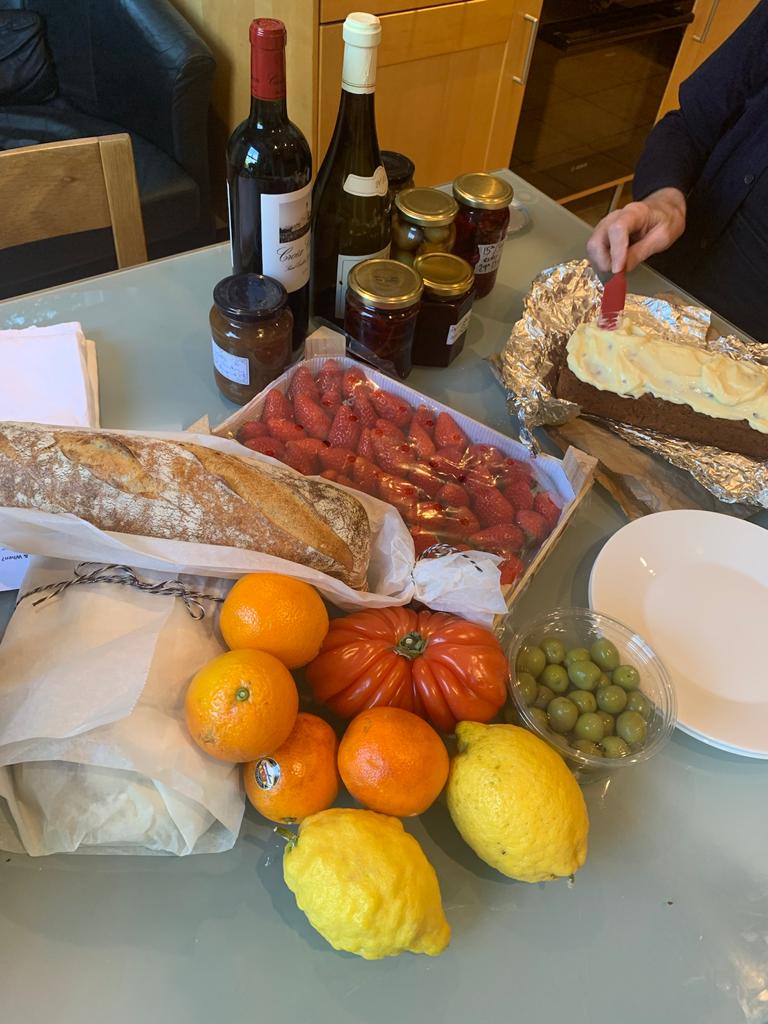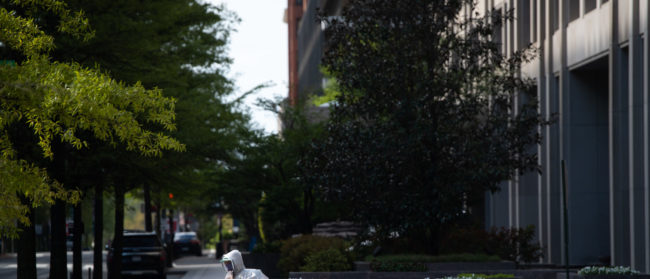I’d never really known what it meant to be in shock before. Like most, I’ve endured my share of emotional hardship, but it’s always been more of the slow-burn variety than a sudden jolt.
But finding myself in an entirely unfamiliar state that day – in the foetal position on the floor of my balcony, staring blankly out to the busy Phnom Penh street below – I can only surmise that’s what I was experiencing.
It wasn’t simply my father’s death that had prompted this stupor, he had been terminally ill with prostate cancer for more than two years and was almost certainly entering his final few months.
It was the speed of his decline, a matter of days, brought on by what was then suspected to be an attack of the novel coronavirus, Covid-19.
“A cornucopia from Tom!” my father’s last Whatsapp message to me had read, accompanied by a picture of him posing thumbs up in his kitchen – merry but visibly weak.
He was describing the package he had received from his nephew that Saturday, a basket of culinary indulgences delivered to his home to spare him, a vulnerable individual, from venturing into England’s quarantined capital of London.
It would be on Wednesday, just four days after that jolly declaration, that I would receive a call from my sister telling me he had passed away on the Covid-19 isolation ward of the south London hospital he had been admitted to a day prior.
Message after message, call after call of mine would go unanswered in those helpless final 24 hours he spent alone on the ward, unable to receive family or friends at his bedside for risk of potentially spreading the disease.
A fiercely independent man his whole life, I could only imagine the despair and isolation he must have felt at his autonomy, and the autonomy of those around him, being wholly stripped on what would prove to be his final day.
We were told his passing was peaceful and swift in his sleep – undeniably comforting information. But it would do little to assuage the guilt I felt at being stranded 10,000km away in Cambodia from the man who had raised me at the time of his passing.
My father and I had both always banked on there being fair warning that the end was nearing – a slow descent over the course of weeks or months as is often the case with cancer. This assurance of a goodbye was the comfort I held on to, perhaps naively, whilst shuttling back and forth from Southeast Asia these past two years.

But with early April greeted with a recorded 1.45 million Covid-19 cases worldwide, international flights all but shutting down, and the UK severely tightening its social distancing measures, I was forced into an agonising decision.
Return to a city in complete lockdown for an indefinite period, knowing it would likely result in me losing my job, apartment and life in Phnom Penh. Or remain and run the risk of an expensive, or potentially impossible, journey home should my father fall ill in the near future.
That fateful final decision was settled by his characteristic pragmatism, devoid of sentimentality and pretence.
“You’d be absolutely bonkers to come home,” he told me flatly, a mere week before his death. “It’s much worse here than it is in Cambodia. You have a good job, a good apartment, you’re living in a nice city. And who knows how long you’ll be stuck here?”
He was right, Cambodia had 100 or so cases compared to the UK’s tens-of-thousands, with life continuing with a reassuring normality in this part of the world.
And so I stayed – my father’s logic, unshakeable as it seemed at the time, inevitably taking on a level of imprudence with hindsight.
There are hard-to-anticipate complications, both emotionally and practically speaking, that accompany a bereavement during such unprecedented times.
In the immediate aftermath, prominent in my mind was the feeling he departed as a mere statistic – one of the 900 or so nameless and faceless Covid-19 cases who had died along with him that day in the UK, only to be solemnly reported on the evening news.
Asked if I wanted him to deliver a message, my request was a simple one: ‘Tell dad I’m sorry I didn’t get to say goodbye.’
But these thoughts would barely settle before the practical implications of having your father pass away during a global pandemic became apparent.
With my father’s Covid-19 status yet to be determined, my brother would be the only person permitted to see his body. Asked if I wanted to deliver a message, my request was a simple one: “Tell dad I’m sorry I didn’t get to say goodbye.”
By the time it transpired he had in fact died from pneumonia-related complications, closely mimicking the symptoms of Covid-19, it would be too late to reverse the unnecessary (but responsible) isolation that had been imposed upon him in the days before and after his death.
With a ban on social gatherings in the UK, preparations for his burial would also be impacted. Funerals by their nature represent an occasion to figuratively and literally lay a loved-one to rest, but this opportunity for closure remains on hold until the situation normalises – a likely timeline of months rather than weeks.
Two weeks on, the majority of the shock at his sudden passing has subsided. What’s left is a lingering ennui, prolonged by the ever-present reminder of the exceptional circumstances of his death in the form of an ongoing pandemic-dominated daily news cycle.
But perhaps my deepest comfort lay in the unintentional poeticism of his final spoken words to me, uttered the weekend before his death.
After having spoken on the phone for over an hour, conversation was running low after all the usual updates about life, work, football and cinema.
“Are you ok dad, you seem a bit quiet?” I enquired.
“Yes yes of course I am,” he replied in customarily direct fashion. “I guess I’ve just run out of things to say to you.”
This story is part of the Globe’s collection of personal essays from across Southeast Asia called Tales of the Pandemic. Published each Monday and covering different aspects of life during this unprecedented time in human history, all of these Covid-19 personal essays can be found here. If you’d like to contribute a personal essay of your own, please email your story of roughly 1,000 words to a.mccready@globemediaasia.com.


